
I’m going to quit my job, move to the Caribbean, and spend my days slurping down dark N’ stormys and bathing in the island sun…Haven’t we all had this unrealistic vision at some point in the stages of our careers? Well, online travel agency owner and WordStream client, Jason Bateman, made his daydream a reality, when he packed up and moved from the snow banked mountains of Colorado to the picturesque rainforest in Costa Rica. Fifteen years ago Bateman studied abroad in Costa Rica and upon graduation was far too in love with the country to not pack his bags and make it his new home. He spent two years as an under-paid teacher, plugging away at his travel website in between classes. December 2014 marked the 10-year anniversary of Bateman’s successful and thriving travel agency, Vacations to Costa Rica.
“The time of travel has changed,” says Bateman. “Twenty years ago if you wanted to book a trip, you would drive over to your local travel agency, but now people start their journey on Google so we have to be there right when they’re getting interested in traveling to Costa Rica.”
The internet accounts for over 74% of both leisure and travel planning, according a recent Google study conducted by Ipsos MediaCT. With 57% of leisure travelers and 64% of business travelers claiming that they always start their travel booking and shopping process with search, having a robust paid search strategy is beyond critical. Although with competition like Expedia, Orbitz, and millions of unique travel offerings out there, how does one stand out and capture quality leads through search engines like Google and Bing?
What can travel marketers do to get return from their paid advertising spend? After speaking with several successful WordStream travel clients in the space I’ve found these 7 travel marketing tactics to be proven successful for a variety of travel businesses of varying models and offerings.
Tip #1: Adjust Your Offerings, Bids, and Budgets to Seasonality Patterns & Target Demographics
Do you think a retired doctor is interested in an all-inclusive spring break package to Cancun? Well, possibly, but that would be a rare, unlikely occurrence and might cause some awkward scenarios for the fellow 18-25 year-old spring-breakers.
If you saw an advertisement promoting cross-country skiing packages in April would you be likely to book? Probably not… Are you understanding what I’m hinting at? Advertisers need to be extremely diligent about timing as well as demographics, because within the travel industry timing and catering to specific personas is beyond critical. AdWords should never be set it and forget it, but with travel, pausing seasonably irrelevant campaigns, making adjustments to ad text, and monitoring locations, time and hour of the day are even more critical for these advertisers to avoid wasting large sums of marketing spend.
Beyond targeting the right locations, languages, etc., travel marketers need to be diligent about keeping up-to-date with seasonality trends and updating their keywords, ads, landing pages, etc. as necessary. Travel marketers should…
- Bid higher on locations, days, and hours when people are more likely to book travel: Are there certain states or cities which tend to generate a larger chunk of your traffic? What about specific zip codes where affluent travelers reside? The Dimensions tab in Google AdWords should become your new best friend. “We’ve used the geographic report (within the Dimensions tab) to identify the five states where people looking to travel to Costa Rica reside and made bid adjustments to bid higher on California, Texas, New York, Florida and Colorado,” says Bateman. Once you have a substantial amount of data, dig into your geographic report to get a sense of the main locations people are searching from and make adjustments to your bidding strategy from there.
Within the Dimensions tab you can also gain insight into the days of weeks and hours of the days that you’re getting the highest return and choose to exclude or bid higher on certain days/times. Tom Popper, President of the non-profit travel organization Insight Cuba, found that bidding higher on specific hours made a huge impact on his lead quality. “Having our ads appear during those peak hours when our audience actually pays attention is critical,” says Popper.
- Create separate campaigns for each destination: Aside from giving you better control over your budget for higher interest locations, which have higher advertising needs, this will also allow you to easily pause and un-pause your campaigns that are relevant per season. For instance, in the fall you might want to run your winter vacation campaigns, but you’re more likely to pause these destinations in the spring.
- Adjust ad copy to speak to a seasonably relevant demographic: Jason Swick, Director of SEM at SimpleView, manages paid media campaigns for over 50 clients in the travel & tourism space. Swick has found that catering the search experience to a specified audience is critical, but with limited demographic targeting capabilities through the search network, Swick hones in on his client’s target audience through creating relevant ad text. “Certain times of the year the audience we’re catering to is much older so we’ll tweak ad copy to make it more engaging to an older generation,” says Swick. “We always look at demographic data and take that into account.”
- Utilize Ad Customizers: You might not be familiar with ad customizers since they’re a relatively new feature Google released in December of 2014, but for the travel industry these babies can save you a lot of manual work, and allow you to create a sense of urgency within your ad text. Ad customizers are similar to dynamic keyword insertion – they essentially allow you to add in a limited-time or reoccurring countdown or discount that updates itself. For example, if you’re a hotel offering an all-inclusive package for a certain time period you could use an ad customization to display how many days are left for that limited-time deal. Learn more and give Ad Customizers a try (your competitors are likely not using them)!
Tip #2: Find an Intriguing Niche or Selling Point and Dominate it on the SERPs
With travel, finding attractive selling points is a piece of cake (or it should be)! When your industry prides itself on having fun, seeing the world from a new perspective, and gaining new life experiences, it isn’t too hard to appeal to searchers.
With that said, if everyone’s bidding on the same keywords and serving up the same offerings then life as a travel marketer could be a bit more challenging. You might not be the only genius promoting tropical getaways to freezing cold New-Englanders in January. “I’ve found myself competing with huge agencies like Expedia, Orbitz, and TripAdvisor, who are spending millions upon million on AdWords each year,” says Bateman. So your budget is limited and paying $20 a click to compete with TripAdvisor is not putting enough food on the table? Try these techniques to dodge your competition and dominate your niche:
- Find an unexplored niche: Do you own a beach-front hotel that offers windsurfing classes or paragliding adventures? Perhaps you run a tourism operation in Tuscany which leads truffle hunting excursions every weekend? Bateman spun his offerings to serve a much more niche audience when he realized his budget was becoming eaten up too quickly. “I’ve had tremendous luck with bird-watching packages – that was a niche that had never even been explored before. There’s lots of competition in travel, so it’s all about finding unexplored niches and dominating those in the SERP’s.”
- Ask, what makes us different? Does your hotel pride itself on its award-winning cleanliness? Does your airline have seats with 20% more leg room then the average airline? Popper really hit the nail on the head when explaining what makes InsightCuba different. “Our travel is not about laying on a beach and drinking daiquiris. It’s about truly discovering the beauty of Cuba by meeting people in real-life settings,” says Popper. “The memories our travelers cherish the most are the interactions with the local people.” Popper went on to explain a scenario that truly put things in perspective. “Maybe you travel to France and every morning you go to the same bakery, be-friend the baker, and study how he manages the dough. These are the stories and experiences that people are going to take home with them and become engraved in their memories.”
Image via Flickr
Bateman is another prime example of a travel marketer that knows how to stand out. “Since we live in Costa Rica, we give our clients real advice, as in I’m talking to you as I’m in the rainforest right now,” says Bateman. “We’re on call for our customers 24 hours a day, we charge no service fee for booking with us, and we offer custom vacation packages so you can add as many tours, transfers, and hotels as you’d like.”
So what does this have to do with AdWords? After you’ve found out what truly makes your travel offering unique, utilize this in your ad text, sitelink and callout extensions, and landing pages. For example Popper uses taglines like “Discover Cuba through the people.” Bateman set up callout extensions saying things like “Costa Rica Specialist – 24 hour advice” and “Local Knowledge – Real Advice.” Showcase your company’s distinctive offerings because this is what will guide them to book with you over your competitors.
Tip #3: Get Visual on the Display Network
Did you know that 67.5% of ads on the display network are plain text ads! Honestly, it’s still hard for me to believe…If you’re in the travel industry and you’re not advertising on the display network with visually captivating ads, then you must have something wrong with you. This tip seems obvious to me because travel is probably one of the most visually captivating industries out there. Just walk around your office right now and check out how many desktop backgrounds are travel destinations.
WordStream study documenting that image ads have much higher click-through-rates then text ads.
“Just the image of the location can sell itself,” explains WordStream’s Paid Search Strategist, Sergey Rusak, who sees tremendous success with the paid search display campaigns he runs for his travel clients.
One of our clients at WordStream was seeing so much success with travel on the display network that they stopped doing search! Although I would not encourage stopping search because that’s often where the journey starts, it should be clear to you now that display advertising is well worth putting some sweat and tears into when in the travel industry. With that said, it’s important to make sure you’re doing it right. So aside from using captivating visuals, follow these additional tips below for display success:
- Create customized remarketing campaigns: Remarketing is extremely powerful for most industries. With travel, since the sales-cycle tends to be a bit longer and the opportunity to be insanely visually compelling is there, this makes remarketing even more profitable. “We get so many comments on how omnipresent we are because most people don’t understand how remarketing works,” says Popper. “They think we’re so smart we can follow them everywhere they go.” Set up remarketing campaigns that target people who viewed specific pages on your site or completed specific actions. For instance, if a searcher visits your landing page for white-water rafting excursions, follow them around with ads showing happy vacationers rafting down the river.
Image via Flickr
- Keep an eye on display campaigns and optimize regularly: “Display can be a black hole of money if you’re not careful,” says Swick. “After we refined our demographic targeting and contextual buys, we found great performance come from Display with several of our clients getting really high click-through rates.” Swick goes on to explain the importance of giving display the same love you give search. “We keep a close eye and use tight interest and demographic targeting. Sometimes we’ve found high CTR’s, but high bounce rates as well so then we’ll know to go back in and make sure targeting is set up well or optimize landing pages.”
- Make sure your images are contextually clear: As in aside from showing a pretty picture of a sunset beach, provide context of what the offer is within the visual to give the viewer a clear idea of where they’ll be directed if they click on your ad. “Visuals work well, but sometimes too well,” says Popper. “For instance, we’ll get a successful click-through rate and that’s great, but sometimes cost per lead goes up because you get someone who’s not necessarily interested in the product.” The ad below is a prime example of adding context to an offer. STA Travel presents a compelling visual, but they also provide just enough text to show where the user will be directed once clicking the ad, weeding out irrelevant clicks.
Tip #4: Create Trusted and Socially Validated Landing Pages
Let’s face it, traveling is a financial investment! When people book travel they’re providing confidential financial information, which is always a risk. This is why providing proof that your services are secure and legitimate is beyond necessary. “Trust signals are really important to us,” explains Bateman. “We have client testimonials on every landing page, and we’re licensed by the Costa Rican Government and members of the National Chamber of Tourism. We want our visitors to understand that we’re trustworthy and reliable.”
Popper agrees. He’s found that providing customer testimonials as well as using trust-worthy language helps with converting landing page visitors. “You can travel legally to Cuba for the first time in 50 years. This message really resonates with people. We’ve been licensed by the department of treasury since 2000, and we were the first to receive the license and bring America’s safety to Cuba under this provision so we make sure our leads are aware of this.” Providing validity and trust is critical for users, so make sure to incorporate any legal certifications that your travel business has and clearly display customer testimonials so leads in the research stage of the funnel can be persuaded to book with you over your competitor. Check out Insight Cuba’s landing page below, which has legal validity, customer recommendations, and testimonials from respected and well-known sources.
Tip #5: When seeing return, continue to add fuel to the fire
Another huge benefit of the travel industry is that opportunities to grow your reach are somewhat limitless. Of course, there will be niches that might not be as popular, but for the most part, travel is an industry that will always be alive and thriving. If you’re seeing success with a particular campaign, destination, or offering then don’t be afraid to raise your budget because with a higher budget you’ll likely get even more return.
In the past, Bateman relied heavily on SEO to get traffic to his website, but when he was hit my Penguin in 2012 he lost almost all of the organic traffic flowing into his website. This is when he turned to paid search. “I used to live in fear. I thought my boss was Google and at any moment they could wipe us off the internet. I’m now super excited because paid search has given me security to even be able to complete with the big guys,” says Bateman. “All of the good traffic I’m getting is from PPC and it’s keeping my business alive. I know it’s working.”
Bateman has also found that adding budget to his profitable campaigns just continues to grow his return on PPC. “My business is scalable. I’ve seen no limit on the number of leads I can get from this. Who cares how much you’re spending on AdWords if you’re generating a profit? It’s a great industry to be in.”
Popper has also made paid search his main marketing focus. “The majority of marketing budget goes into AdWords without a doubt. We get a huge amount of impressions at the top of the page through AdWords, and it’s always proven to be a source of growth.”
So, keep a close eye on your campaigns, and for the ones that are yielding a profitable return, try upping your budget.
Tip #6: Expand to Bing
This tip can be relevant for many industries, but travel in particular has been one to show great return on Bing. Also since competition can be a challenge, Bing gives travel marketers the ability to really own and dominate the search results.
Swick has seen great return through Bing Ads. “Bing’s gotten so much better over the last year. The numbers in terms of performance are great, but we do see more volume on Google.”
Moral of the story, focus on AdWords first and then set a chunk of your leftover budget to experiment with Bing because it’s typically cheaper with less competition – what could be better!
Tip #7: Subscribe to Google’s Travel & Tourism Blog
If you want to stay ahead of the competition you need to keep educated on the industry. Lucky for you, Google has a digital concierge to advice you on travel techniques and news in your industry. Subscribe, get inspiration from others, and keep up-to-date with changes to fuel your growth and success with paid search.
These tips should set you on the right destination to paid search paradise.
Who’s ready for a vacation?

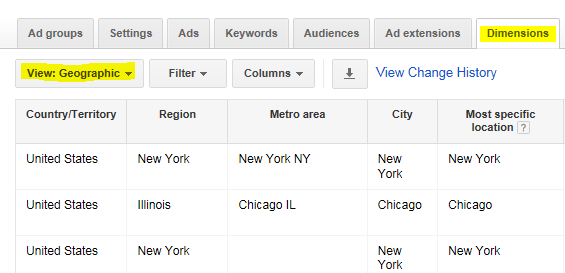

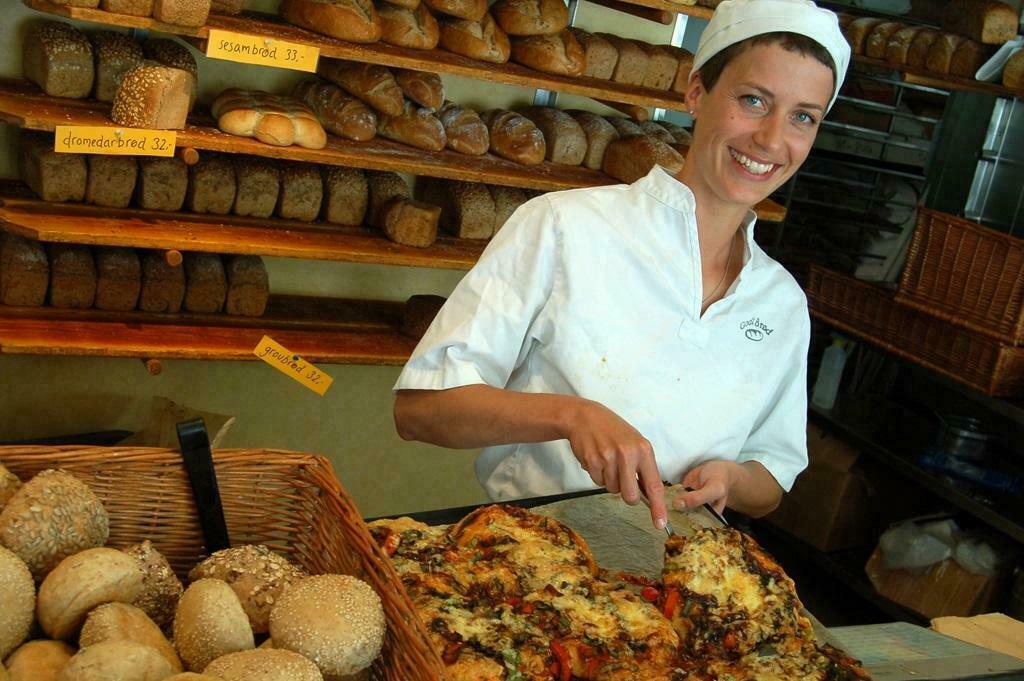
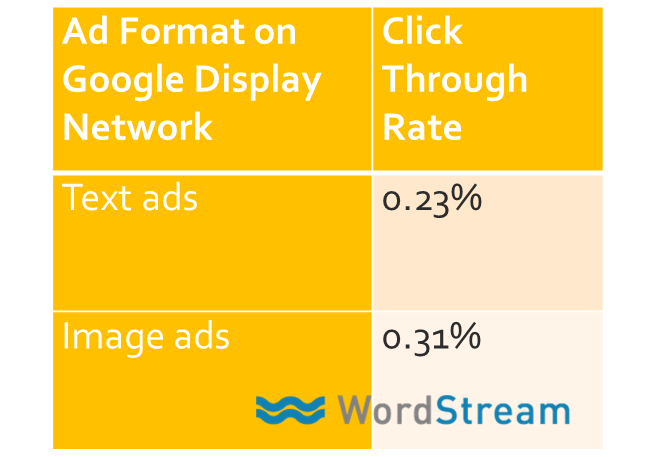
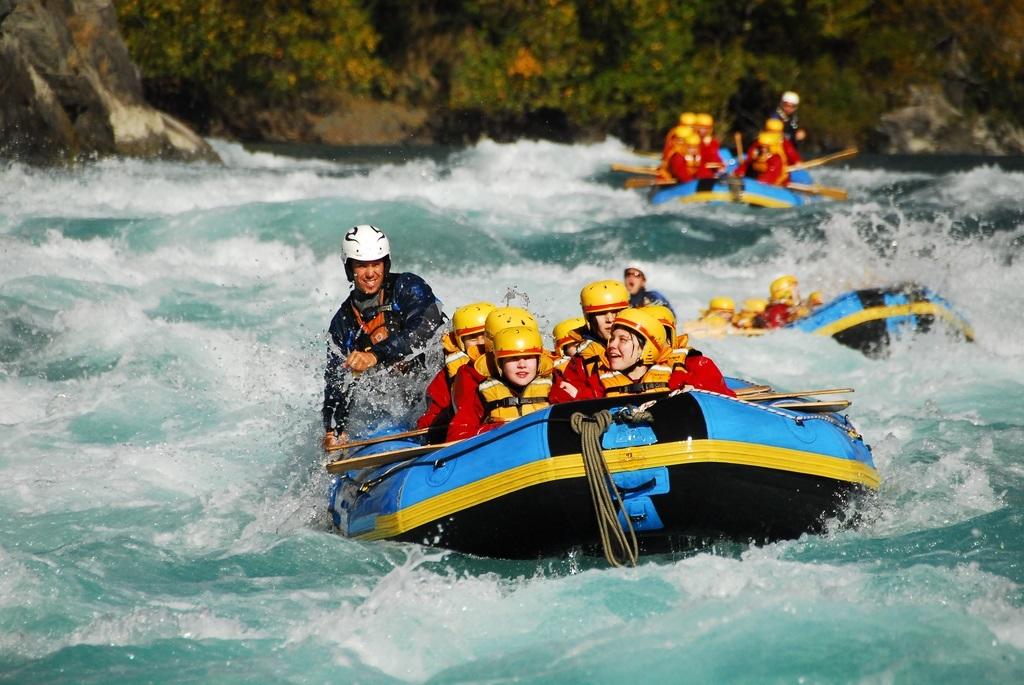

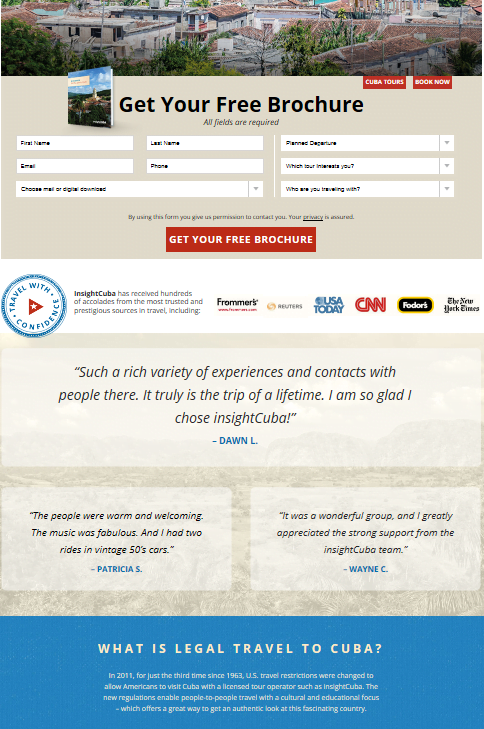
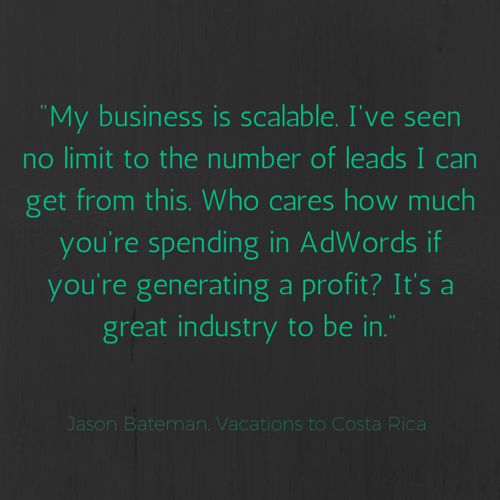

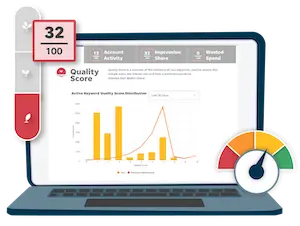







Comments
Please read our Comment Policy before commenting.